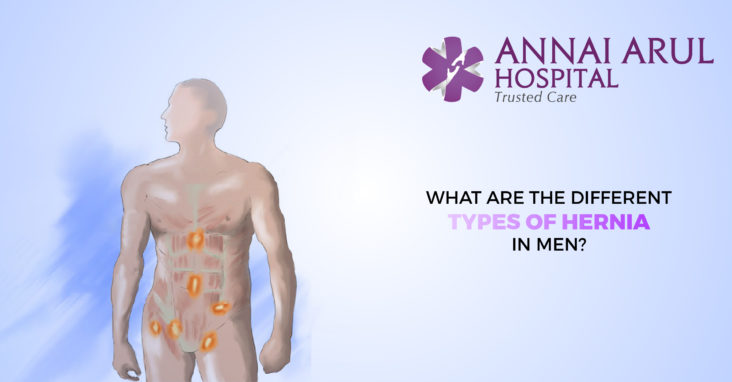Among men, the sort of person who is likely to get a hernia is not necessarily the one who lifts a lot of heavy weights. A hernia can occur just like that when you exercise, cough, strain on your toilet or even as a result of lively sex life.
It is to be noted that hernias occur due to muscle weakness, often near the abdomen area. Hernias occur due to weakness of the cavity wall. These points get weak when there is a natural gap due to a blood vessel passing by or when there is a digestive tube in that place, it can also be due to some sort of scar tissue.
Hernia is first felt when you get a feeling like something has just popped in your belly area or something gave way suddenly.
What are the types of hernia?
A hernia is usually named based on its location in the body.
Inguinal Hernia
These are the common type of hernias. The inguinal canal is where the testes descend before birth. This canal has the spermatic cord and blood vessels. When an inguinal hernia occurs, part of the intestine juts down the canal into the scrotum.
Umbilical Hernia
An umbilical hernia is caused when the abdominal wall gets weakened in the umbilical cord area. This mostly occurs in children.
Femoral Hernia
The femoral hernia occurs when part of the intestine protrudes through the femoral canal and then juts into the top of the thigh. The femoral canal is where the main blood vessel passes into the legs.
Epigastria Hernia
This type of hernia occurs when fat or sometimes intestine protrudes through the abdominal wall between the navel and the breastbone.
Ventral Hernia
This is a hernia that occurs in the abdominal wall which is weakened due to scar tissue and this could be due to a surgery or a trauma.
Obturator Hernia
This type of hernia occurs when a part of the stomach juts through the gap between the bones of the front pelvis.
Hiatus Hernia
When the upper part of the stomach protrudes through the diaphragm usually through the esophagus opening.
What causes hernia?
With the exception of a hernia caused by complications due to a surgery, in most hernia cases there is no apparent reason. But the risk of hernia does increase with age and occurs more in men than in women. Activities and medical problems that increase pressure on the abdominal wall usually leads to hernia.
The causes may include, straining on the toilet, persistent cough, cystic fibrosis, enlarged prostate, straining during urination, obesity, lifting heavy weights, abdominal fluid, peritoneal dialysis, poor nutrition, smoking, undue physical exertion and undescended testicles.
What are the treatments for hernia?
Open or laparoscopic surgery is the remedy and found to be greatly successful both in children and adults.


